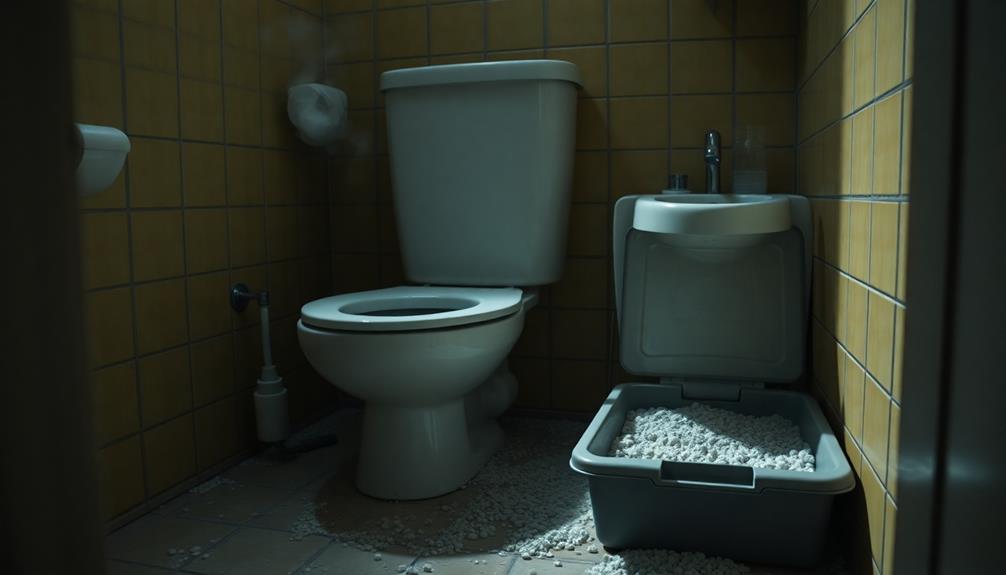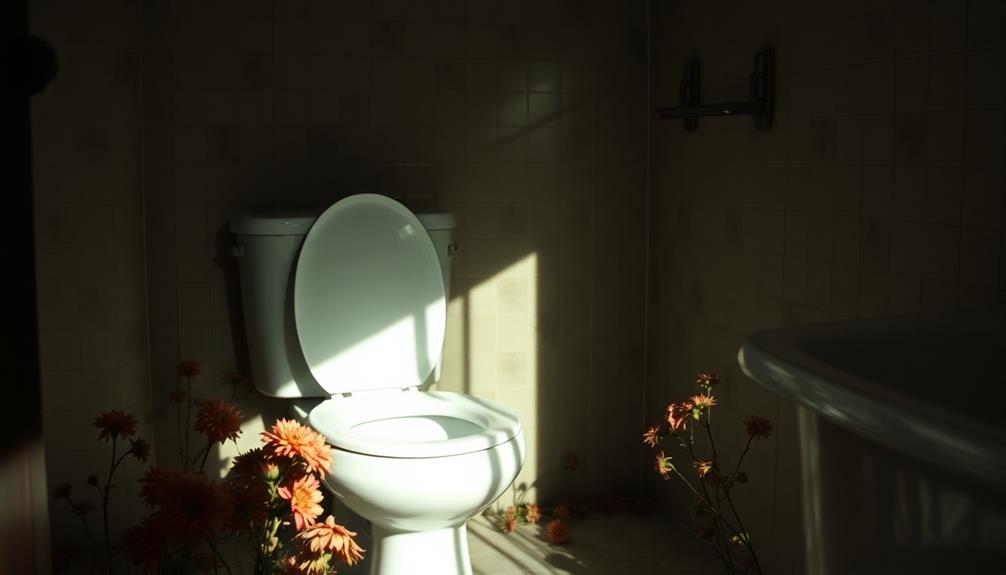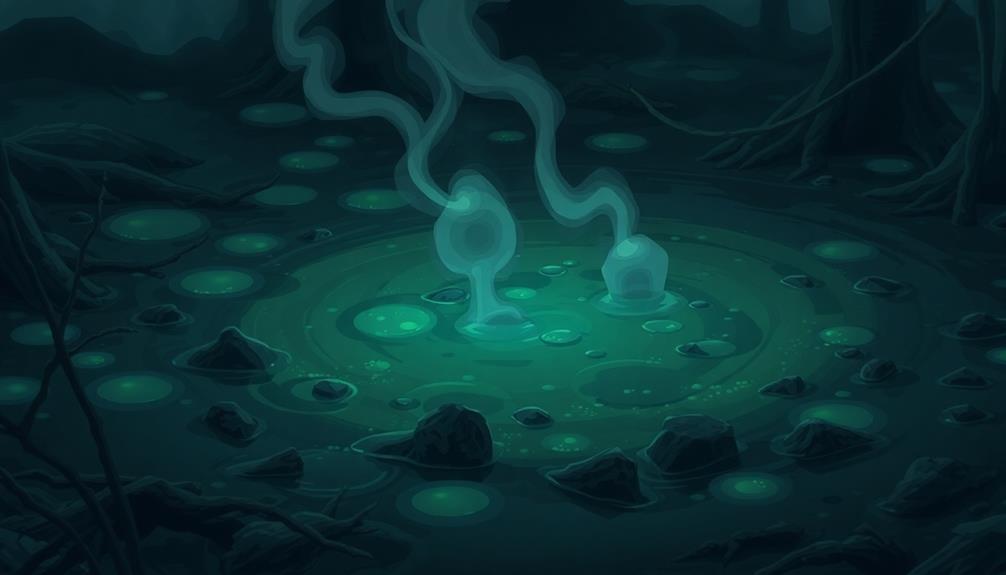When urine smells like ammonia, it gives off a sharp, pungent odor similar to harsh cleaning products. This often happens when you're dehydrated or if your urine is concentrated, which can happen due to fewer bathroom breaks or hot weather. If you consume a lot of protein, that can also strengthen the ammonia scent. It's a good idea to stay hydrated for better-smelling urine and overall health. If the smell sticks around or comes with other symptoms, it's wise to chat with a healthcare provider. Curious to know more about what might affect your urine's smell?
Key Takeaways
- Ammonia smell in urine is sharp and distinct, often likened to cleaning products or cat litter.
- Concentrated urine due to dehydration typically intensifies the ammonia odor.
- High protein diets can elevate urea levels, leading to stronger ammonia smells in urine.
- Certain medical conditions, like UTIs, can also produce an ammonia-like scent in urine.
- Persistent ammonia odor may indicate dehydration or underlying health issues, warranting medical consultation.
Introduction

Ammonia has a distinct, sharp smell that many people associate with cleaning products or cat litter. When it comes to urine, this pungent odor often happens when your body creates concentrated urine. This can occur due to dehydration, causing your urine to have a higher amount of waste products.
If you've ever noticed a strong ammonia smell in your urine, it might be linked to your diet, especially if you eat a lot of protein.
Sometimes, these odors might signal health issues, like urinary tract infections (UTIs) or bladder stones. If you experience other symptoms, such as pain while urinating or cloudy urine, it's essential to pay attention.
A persistent ammonia smell could indicate that something's not right, and it's a good idea to consult a healthcare provider for evaluation.
Description of the Smell

The smell of ammonia is unmistakable and often described as sharp and pungent. When you encounter this ammonia smell in urine, it can remind you of cleaning products, perhaps because of the high concentration of ammonia in the urine.
This scent usually means the urine is concentrated, which often happens due to dehydration or not going to the bathroom for a while. Additionally, certain medical conditions might lead to changes in urine odor, making it important to be observant of any unusual smells. Foods can affect urine odor too! When you eat a lot of protein, your urine may smell stronger because of increased urea breakdown.
Potential side effects of medications can also contribute to changes in smell.
Sometimes, an ammonia-like smell can signal a urinary tract infection (UTI). If you notice this, along with burning during urination, it's important to pay attention!
A persistent ammonia smell in your urine might indicate health issues, like bladder stones or liver disease. If you notice this smell stays around or is accompanied by other concerning symptoms, it's a good idea to check in with your healthcare provider.
They can help you understand what's going on and guide you on what to do next. Stay aware of your body—it's your best guide!
Source and Composition

When it comes to understanding the source and composition of urine, it's essential to recognize that ammonia is a key player. Urine is mostly water, but it also contains urea, creatinine, and various electrolytes.
Urea, one of the main components, breaks down into ammonia when urine becomes concentrated. This happens due to dehydration or if you consume a lot of protein in your diet. Proper hydration is crucial, as it can help reduce the concentration of waste products in urine, potentially alleviating strong odors.
Additionally, certain conditions like tick-borne diseases may also influence overall health, which can indirectly affect urine composition.
When you're dehydrated, the ratio of waste products in your urine increases, creating that strong odor you might notice. But dehydration isn't the only factor. Urinary tract infections (UTIs) can also change the composition of your urine.
Bacteria in the urine can break down urea, leading to an even more intense ammonia smell. Certain foods and medications can impact the chemical makeup of your urine too.
For instance, asparagus is famous for making urine smell funny! So, if you ever catch a whiff of that strong odor, remember it's likely a mix of ammonia, waste products, and whatever you've eaten, all coming together in your body.
Understanding this helps you appreciate the complex chemistry at play!
Typical Scenarios or Environments

Dehydration often leads to noticeable changes in urine odor, particularly when it comes to that strong ammonia smell. When you don't drink enough fluids, your urine becomes concentrated and darker, which amplifies the ammonia odor. You might notice this particularly after intense exercise or on hot days when your body conserves water.
Additionally, maintaining good hydration is essential for overall health, including dental health, as dehydration can impact your oral hygiene and contribute to bad breath.
If you're on a high-protein diet, be aware that your urine may smell like ammonia as well. This happens because increased urea production breaks down into ammonia during metabolism.
Sometimes, health conditions like urinary tract infections (UTIs) can also cause your urine to emit a strong ammonia scent, often paired with pain and urgency.
Additionally, certain medications and supplements can change your urine composition, leading to that distinct ammonia smell.
Emotional or Cultural Associations

Ammonia-smelling urine often carries emotional and cultural weight, shaping how people perceive hygiene and health. When you notice this ammonia smell, it might raise concerns about personal cleanliness and hydration practices. Many cultures link strong odors in urine to dietary habits, like eating asparagus or garlic, which can alter its scent. This connection often leads to stigmatization, as people worry about what a strong odor might imply about their health.
Additionally, understanding the importance of financial planning for assisted living can alleviate some anxiety about future health needs, as it emphasizes the significance of proactive care.
In various contexts, the presence of an ammonia smell can evoke feelings of anxiety about body imbalances. You might feel compelled to adjust your diet or drink more water, reflecting cultural perceptions that associate urine smell with overall well-being. Traditional health practices also emphasize how changes in urine can indicate underlying health issues.
These associations can impact how you feel about yourself and your health. Understanding these emotional and cultural connections can help you navigate perceptions of cleanliness and health more confidently.
If you ever feel concerned about the ammonia smell, remember that it's okay to seek advice or make changes to your hydration habits. Your well-being is important!
Health or Safety Considerations

A noticeable ammonia smell in your urine can be a clear signal that your body needs more hydration. When you're dehydrated, your urine becomes concentrated, which may lead to health risks if ignored.
If you notice persistent ammonia-smelling urine, it could indicate underlying issues like urinary tract infections (UTIs) or kidney problems. It's essential to seek a medical evaluation if you experience other symptoms along with this odor.
If you're on a high-protein diet, you might also notice a stronger ammonia scent in your urine. This happens because your body produces more urea from protein metabolism.
Monitoring changes in your urine's smell is crucial for spotting metabolic disorders or infections early, allowing for timely treatment.
To reduce the risk of ammonia-smelling urine, practicing good hygiene is important. Simple habits, like urinating after sexual activity and staying hydrated throughout the day, can make a big difference.
Final Thoughts

Monitoring your body's signals can be key to maintaining good health. If you notice ammonia-smelling urine, it's important to pay attention. This distinct odor often means your urine is concentrated, which can happen due to dehydration, a high-protein diet, or even urinary tract infections (UTIs).
When your body breaks down urea, it can produce that strong ammonia scent, especially when you're not drinking enough water. Ignoring persistent ammonia odor, particularly if you experience symptoms like pain during urination, dark urine, or fever, might lead to bigger health concerns. It's a good idea to seek medical evaluation in such cases.
Staying hydrated and maintaining a balanced diet are your best defenses against ammonia-smelling urine. Drinking plenty of water helps flush out toxins and keeps your urinary health in check.
Frequently Asked Questions
How Would You Describe the Smell of Ammonia?
When you describe the smell of ammonia, you'd say it's sharp and pungent, often reminiscent of strong cleaning products. It can catch you off guard, leaving a lingering, irritating sensation in your nose.
What Does Unhealthy Urine Smell Like?
Unhealthy urine often has a strong, unpleasant odor, resembling ammonia. You might notice it when you're dehydrated or have a urinary tract infection, along with other symptoms like burning during urination or increased urgency.
Does Diabetic Pee Smell Like Ammonia?
Yes, diabetic urine can smell like ammonia, especially when blood sugar levels are high or hydration's low. It's important to monitor these changes, as they might indicate dehydration or the need for better glucose control.
What Illness Makes You Smell Ammonia?
If you notice an ammonia smell in your urine, it could indicate a urinary tract infection, dehydration, bladder stones, or liver disease. It's important to consult a healthcare professional to identify the underlying cause.









